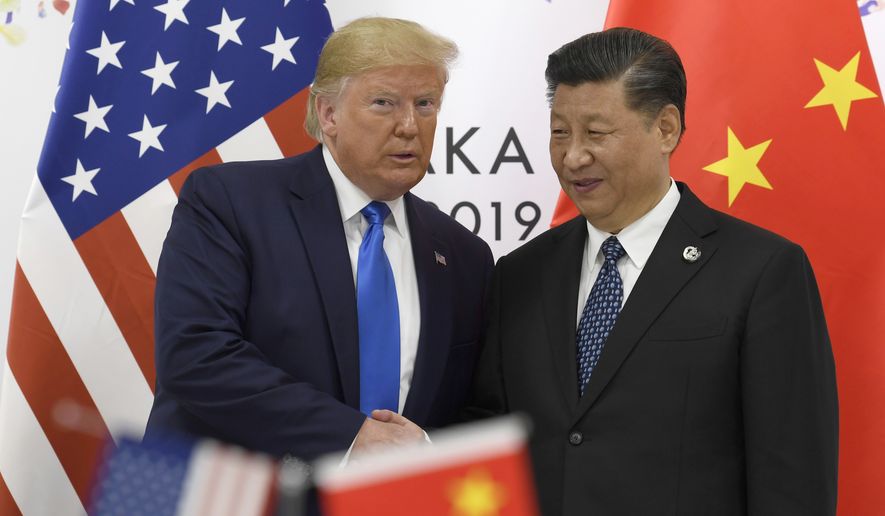The Trump administration on Monday dropped its designation of China as a currency manipulator on the eve of signing the first phase of a long-awaited trade agreement with Beijing.
The Treasury Department took the action before the signing ceremony at the White House scheduled for Wednesday. The agreement addresses some concerns about China’s currency manipulation that were cited when the U.S. announced the manipulator designation in the summer.
“The Treasury Department has helped secure a significant Phase One agreement with China that will lead to greater economic growth and opportunity for American workers and businesses,” said Treasury Secretary Steven T. Mnuchin. “China has made enforceable commitments to refrain from competitive devaluation, while promoting transparency and accountability.”
In its semi-annual review of 20 major U.S. trading partners, Treasury said it also “assessed developments over the last several months with China and its currency practices.”
The report concluded that currency practices of 10 countries were found to require “close attention,” but no major U.S. trading partner meets the criteria as a currency manipulator.
President Trump has long accused China of currency manipulation, saying the practice has created an unfair trade relationship and fueled the massive annual U.S. trade deficit with Beijing.
Senate Minority Leader Charles E. Schumer, New York Democrat, said Mr. Trump was failing to follow through with his tough talk on China.
“China is a currency manipulator — that is a fact. Unfortunately, President Trump would rather cave to President Xi [Jinping] than stay tough on China,” Mr. Schumer said. “When it comes to the president’s stance on China, Americans are getting a lot of show and very little results.”
The designation could have led to U.S. tariffs as a penalty, but the administration has been imposing tariffs on Chinese goods since 2018. China has responded with its own tariffs on various U.S. goods and stopped buying agricultural products such as soybeans.
Stocks closed higher Monday amid the news that the U.S. will stop designating China as a currency manipulator, as optimism about the trade agreement continued to spur a bull market. The S&P 500 gained 0.7% to close at a record-high 3,288 points. The tech-heavy Nasdaq rose 1% to hit its record high at 9,273 points.
“The stock market is way up, the country is doing really well, and we’ll see you at the game,” the president said as he departed the White House on Monday afternoon on his way to the college football championship contest in New Orleans.
But there was also sobering news Monday from the Treasury Department, which reported that federal deficit topped $1 trillion in 2019 — the first time red ink has topped that level in a calendar year since 2012.
The budget shortfall of $1.02 trillion in 2019 was a 17.1% increase from 2018.
Mr. Trump will host the high-level Chinese delegation at the White House to sign the trade agreement, ending for now a simmering trade war that has hit especially hard in farming communities. The federal government has approved nearly $30 billion in bailouts for farmers and ranchers who lost business because of the feud.
The president is scheduled to promote his trade policies Sunday in a speech to the American Farm Bureau Federation’s annual convention in Texas, the farm group announced Monday. China is expected to increase its purchase of farm products to a level of about $40 billion per year, Mr. Trump has said.
In addition to reaching a partial trade deal with China, Mr. Trump has renegotiated a major trade agreement with Mexico and Canada that is nearing final approval by the Senate. Administration officials say that deal, too, will produce more jobs in the U.S. and boost the economy.
Mercatus Center economist Daniel Griswold said the phase one deal with Beijing “marks a welcome retreat from the self-destructive trade war between the U.S. and China.”
“The tariffs imposed by the Trump administration and the inevitable retaliation by China have inflicted real costs on U.S. farmers, manufacturing firms and consumers,” he said. “The right way forward would be the elimination of all remaining Section 301 tariffs, direct legal action against offending Chinese entities, and the return to the [World Trade Organization] as the appropriate forum for settling disputes with China over trade policy.”
• Dave Boyer can be reached at dboyer@washingtontimes.com.




Please read our comment policy before commenting.